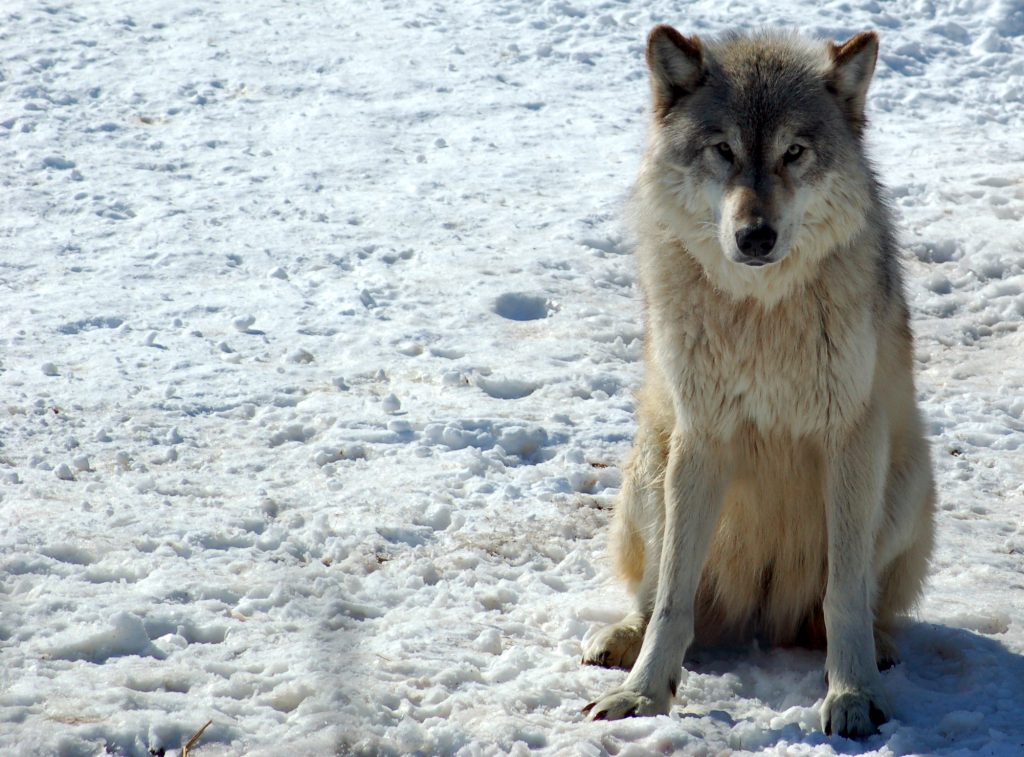Conservative Lawsuit Demands a Wolf Hunt
Hunter Nation says the rights of its 20,000 members violated by state ruling against wolf hunting.

Gray wolf. Photo by Derek Bakken / (CC BY)
A conservative advocacy group filed a lawsuit Tuesday against the Wisconsin Department of Natural Resources and its citizens advisory board, arguing the agency is violating state law in its decision not to hold a wolf hunt this winter.
The lawsuit filed by the Wisconsin Institute for Law and Liberty (WILL) on behalf of Kansas-based Hunter Nation comes a little over a week after the Wisconsin Natural Resources Board narrowly rejected a request by Republican lawmakers to direct the DNR to immediately resume a wolf hunt.
Hunter Nation contends the agency’s decision violates the rights of their roughly 20,000 members in Wisconsin, according to Luke Hilgemann, the group’s CEO and president.
“Clearly, this comes down to whether or not the administration is going to follow the law, and whether or not they want to have the management of a wild population of wolves that’s growing beyond our stated goal of management,” said Hilgemann.
Hilgemann said they’re suing to force the DNR to immediately resume the wolf hunt in compliance with state law. Under state statute, the DNR is required to hold a single wolf hunting and trapping season from Oct. 15 through February when the animal is not listed as an endangered species.
A DNR spokesperson said in a statement that the agency is reviewing the complaint and has no further comment at this time.
“Although gray wolf management was returned to the lower 48 states and tribes in 2021, implementing a wolf season requires adequate time not only to develop a science-based harvest quota but also to engage the public and tribal partners in the development of a season plan that adequately reflects the interests of diverse stakeholders throughout Wisconsin,” wrote the agency. “We are continuing to take the steps necessary to implement a wolf hunt beginning in November 2021.”
The state’s wolf management plan was first approved in 1999 and updated in 2007, setting a population goal of 350 wolves for the state. That figure was based on population projections far below the more than 1,000 wolves that roam the state, according to the DNR’s most recent count.
Hilgemann said there are “forces” across the country that want to see wolves relisted as an endangered species, which he fears would limit wolf management in Wisconsin.
Multiple environmental and animal rights groups like the Center for Biological Diversity and Humane Society of the United States (HSUS) told the Natural Resources Board there may be legal ramifications if the state moved forward with an immediate hunt.
Megan Nicholson, Wisconsin state director for HSUS, said in a statement Tuesday that the board correctly voted not to move forward. She contended that an immediate hunt would violate state law since the language calls for a single season each year that begins in the fall.
“Not only would an early 2021 wolf season be unlawful and go against the decisions of the NRB and the commitments of the DNR to transparency and broad public engagement, but it would also spell disaster for Wisconsin’s wolves and halt any progress they’ve made after decades of persecution,” said Nicholson.
Nicholson also highlighted that the board rejected lawmakers’ request to resume the wolf hunt because members feared the state wouldn’t meet its legal obligations to consult with tribes on wolf management.
Multiple Wisconsin tribes said at the board’s meeting that a hunt should not move forward this winter because the DNR had not met its obligation to consult with them as laid out in a 1983 court ruling known as the Voigt Decision. The ruling affirms tribal rights to hunt, fish and gather in ceded territory under treaties with the federal government and requires the state to coordinate with tribes on natural resource management.
Dylan Jennings, public information director with the Great Lakes Indian Fish and Wildlife Commission, said the wolf or Ma’iingan is a keystone species or relative for the commission’s member tribes and represents an iconic emblem of their clan systems or forms of government.
“They’re just concerned that these efforts to rush into a wolf hunt in the state goes counter to the procedural components outlined in the current and existing process that the state is supposed to follow,” said Jennings. “Any changes or veering away from this process would deny our member tribes the proper consultation process.”
Jennings also highlighted biological concerns with hunting wolves in the middle of their breeding season. He said hunting wolves doesn’t make sense to tribes, which are subsistence-based communities, if the animals are not being utilized for their hide or food.
“They’ve had multiple years to have these types of conversations, bring the wolf management committee to the table, and figure out a management plan, and they refuse to do so,” said Hilgemann.
Wisconsin Republican U.S. Reps. Tom Tiffany, Mike Gallagher and Glenn Grothman have introduced a bill to permanently remove the gray wolf from the federal endangered species list. Lawmakers highlight wolves have harmed pet owners and farmers within the wolf’s range in northern and central Wisconsin.
Last year, hunters and farmers reported 86 confirmed or probable instances of wolf depredation, according to DNR data. The DNR has provided more than $2.7 million in damage payments to hunters and livestock owners over the last three decades.
Hunters in Wisconsin killed 528 wolves in the three seasons a hunt was held in the state before a federal judge ruled in 2014 that the animal should be placed back on the endangered species list.
Listen to the WPR report here.
Conservative Advocacy Group Files Lawsuit Against Wisconsin DNR, Advisory Board Over Wolf Hunt was originally published by Wisconsin Public Radio.





















